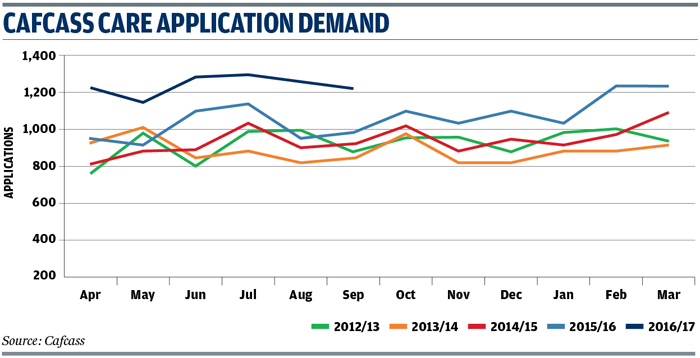In a good place
Joe Lepper
Tuesday, October 25, 2016
As the number of children in care reaches record levels, Joe Lepper examines the challenge for commissioners to provide children with stable, happy homes that cater to their needs.

Securing suitable placements that meet the needs of children and young people is critical to the "care" system living up to its name. However, the shortcomings within the system in coping with England's rising looked-after children population have come into sharp focus this year.
Ofsted's latest annual review of social care found that only half of local authorities have a good understanding of how their local market can meet children's complex and diverse needs. This is leaving many local authorities resorting to panic spot purchasing rather than "proactively approaching providers and commissioning placements that are right for the children they look after," says Ofsted. The effect on children can be devastating, with poor commissioning leading to unnecessary moves through placement breakdowns.
Residential care commissioning has come in for particular criticism, since it is still often regarded as a last resort rather than considered earlier in a child's time in care. This was one of the key themes addressed in Sir Martin Narey's government-ordered review of children's residential care in England.
Narey's review, which reported in July, also questions how well council commissioners are securing value for money. He cites Oxford Brookes University research that found weekly per child prices ranged markedly from £1,900 to £9,325.
Andy Elvin, chief executive of fostering and adoption charity The Adolescent and Children's Trust (TACT), says that children's care commissioning is often treated by councils as merely another service to procure, under tendering rules that "are the same for everything, from bin collection to children's care placements". Short termism in council funding is also a huge stumbling block to effective commissioning, adds Elvin.
Year-on-year funding allocations from central government "mitigate against making good decisions for children", he says. "For example, if you are overspending in December and the specialist placement you want for a child is going to blow the budget further, then a council may hold the child in a placement that costs less but is unsuitable."
Regional collaboration
Narey's review urges more regional collaboration in order to improve commissioners' ability to pinpoint the best placement for each child.
National Children's Bureau (NCB) director of external affairs Enver Solomon says this is particularly the case for highly specialist placements. As an example of such poor planning, he cites a recent conversation with two council commissioners "who had really struggled to commission places for two young men, who were victims of sexual exploitation but also displayed sexualised behaviour that meant they couldn't be with young women".
Kevin Gallagher, managing director at Amberleigh Care, a provider of such specialist placements for boys, says this example comes as no surprise. He backs calls for better information sharing of specialist care "because they are low-volume and highly complex, so not widely available".
Charlotte Ramsden, chair of the Association of Directors of Children Services' health, care and additional needs committee, and director of children's services at Salford City Council, says local authorities are getting better at sharing such information but "there is definitely more to do".
Regional commissioning can also help councils save money, through block purchasing agreements where providers offer discounts, Narey's review highlights.
The Department for Education's policy paper on children's social care, Putting Children First, has pledged to use money from the children's social care innovation programme to fund pilots of large-scale regional commissioning. A DfE spokesman says that further details around this will be released "in due course".
Existing examples of effective regional commissioning are thin on the ground though. Narey points to a therapeutic residential care partnership between provider Keys Childcare and six councils: Buckinghamshire, Oxfordshire, Hertfordshire, Milton Keynes, Bracknell Forest and Reading.
This was awarded to Keys in 2010 on an initial five-year arrangement and since extended for a further three years. This £25m contract sees Keys provide the councils with a specialist school plus 20 children's residential care places across six homes. Each council has an allocation, which can be traded with the other five depending on changing demand. It relies on the continued commitment and co-operation of all six authorities - if one leaves, the partnership is dissolved. The provider is assured they will be paid for their beds at all times so is able to offer better rates per place.
Buckinghamshire, which co-ordinates the project, estimates the cost of each Keys placement at around £1,300 less than the £4,300 cost of spot purchasing. Each year, the deal saves the six authorities a combined £1.4m.
Simon Brown, project lead and head of children's care services at Buckinghamshire County Council, says: "With the Keys project there is no additional costs for us. If the child has additional needs, Keys meet those and cannot charge us extra." While the arrangement is saving the councils money, Brown says the main benefit is the improved care it provides for children.
He says that while they had anticipated the specialist school would be full, they have found the care and support provided by the homes has enabled many of the children to thrive in their mainstream schools.
Action on reducing missing from care incidents has also impressed Brown. The homes have a strong focus on working with children who run away, to assess the reasons behind such incidents, and work with police to ensure they are returned swiftly.
"Our quarterly reports show the same pattern, of a new child coming in with high levels of missing incidents and over a period of time those have been reduced to zero," he says.
Work on a new tender for beyond 2018 is under way. Changes under consideration include making apprenticeship opportunities available for residential care leavers with the successful contractor. This follows on from one resident already securing work with Keys. Staying Close arrangements, to support children near to homes when they leave until they are 21, will also come under discussion.
Another collaborative block contract is a framework agreement launched five years ago for foster and residential care covering seven East Midlands authorities: Northamptonshire, Nottingham City, Nottinghamshire, Derby City, Derbyshire, Leicestershire, and Rutland.
Citing evaluation by Oxford Brookes University, the deal saves the councils around £1m a year. In his report, Narey asserts that even greater discounts could be achieved "through more aggressive negotiation".
Deborah Mahon, commissioning and strategy service manager at Northamptonshire County Council, says the roster of providers is reviewed annually to ensure it meets local demand.
Value, quality of care and the views of young people who are involved in the tendering process, are the main criteria for providers to be appointed. Mahon says councils have met the challenge of collaborating over a large distance by appointing a project manager early on to work across the region and "iron out any issues".
Already Ofsted has noticed a positive change in Northamptonshire. Its inspection in February praised the council's focus "on improving the quality of placements and the outcomes achieved by children", adding that "the majority of children looked after live in good and stable placements that meet their needs and keep them safe".
Out-of-area placements
But the inspectorate wants Northamptonshire to do more to reduce out-of-area placements and increase local placements. As of March 2015, 16 per cent of looked-after children were placed more than 20 miles outside the council's boundaries, two per cent above the England average and up on the previous year's 13 per cent.
Narey cautions against overplaying the issue of out-of-area placements though. He urges commissioners to "recognise that the right placement for a child is more important than location" and "no longer impose geographical restrictions" on providers.
But Andy Elvin at TACT warns that to dismiss the value of placing a child close to home is "naive" because "a lot of what is best for a child, such as contact with birth family, school and friends' families, is tied up in geography".
Ramsden also says that for most children, maintaining local links is important: "We should always go with a nearby placement where it meets their need unless there was a risk to staying local."
With such disputes still rife and huge improvements to be made in collaborative working, the commissioning landscape will need to look a lot different if it is to effectively meet the needs of England's ever-rising and diverse population of children in care.
Why are care applications soaring and how can a ‘crisis' be averted?
The children's care system in England is on the verge of a "crisis" due to a record-breaking rise in applications this year, according to the country's most senior family law judge. Sir James Munby, president of the High Court's Family Division, made the stark warning in September, shortly after figures revealed a leap of 34 per cent in care applications.
This rise from 941 in August 2015 to 1,258 in August 2016, recorded by the Children and Family Court Advisory and Support Service (Cafcass), represents the largest ever month-on-month increase in care applications since it started central collection of the figures in 2012.
Already 2016/17 is on course for registering the highest annual level of applications on record, surpassing last year's tally of 12,781. There were 7,438 applications in the first six months of 2016/17 (April to September), up 23 per cent on the 6,044 recorded during the corresponding six months last year.
In delivering his warning, Munby condemned the lack of a "clear strategy for meeting the crisis" and said that unless action is taken, the legal system would struggle to cope and the legal aid bill would soar. He called for greater early intervention work to keep families together where possible and avoid cases coming to court.
Among projects he is keen to see expanded is the Pause Project, which looks to prevent repeat removals among mothers who have had children previously taken into care.
The Ministry of Justice (MoJ) and Cafcass share Munby's concerns. During the summer they announced a joint initiative to find ways to stem the rise in applications.
Cafcass chief executive Anthony Douglas says they also want to see an expansion of "small and significant programmes" that target support at families in crisis. He says that "settlement conferences, which are trying to achieve early resolution rather than protracted legal disputes", are also being considered for expansion, as are kinship arrangements.
"There are some parts of the country where exploring kinship arrangements happens routinely but in others care proceedings are issued far more quickly. Once a case comes to court it can be harder to find other solutions within the family," Douglas adds.
The care system is also seeing higher numbers of older children coming into care, with 13,870 aged 10 years or above becoming looked after in 2015, compared with 12,120 in 2013.
Douglas says a heightened focus among councils on child sexual exploitation is a factor in this rise. He adds: "Five years ago there was more likelihood of adolescents drifting and not receiving high enough priority. What CSE has done is bring around a greater focus on adolescents."
With the increase in care applications showing no signs of slowing, Cafcass and the MoJ's work to promote better pre-proceeding work will be crucial if Munby's predicted crisis is to be averted.





